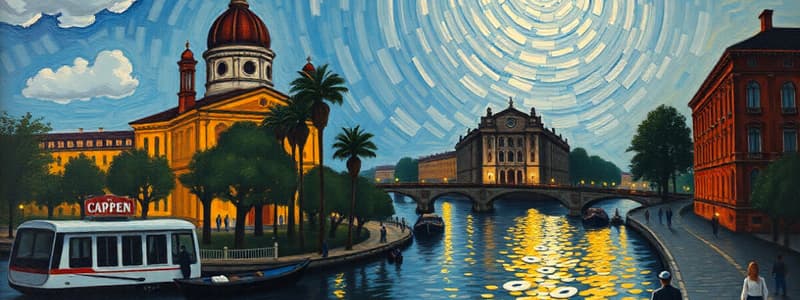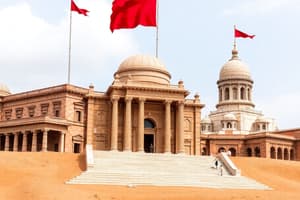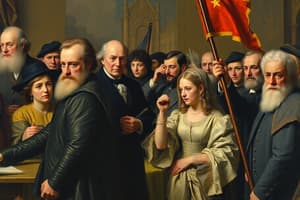Podcast
Questions and Answers
What characterizes an absolute monarch?
What characterizes an absolute monarch?
- A government structure that separates powers
- A leader who is elected by the populace
- A system where the ruler's power is limited by law
- A ruler who has unlimited power over society (correct)
Which statement best describes capitalism?
Which statement best describes capitalism?
- A system centered around private ownership and profit from investments (correct)
- An economic framework that promotes limited investment opportunities
- A model where production and distribution are controlled by the state
- An economic system based on government ownership of resources
What does the Bill of Rights primarily do?
What does the Bill of Rights primarily do?
- Establishes a framework for government
- Protects individuals from government overreach (correct)
- Defines the role of the monarchy in lawmaking
- Gives rights to the government in regulating citizens
What was a significant outcome of the Columbian exchange?
What was a significant outcome of the Columbian exchange?
Which of the following best defines common law?
Which of the following best defines common law?
What is the primary belief associated with divine right?
What is the primary belief associated with divine right?
What best defines feudalism?
What best defines feudalism?
Which of the following best describes a guild?
Which of the following best describes a guild?
What was the purpose of the Middle Passage?
What was the purpose of the Middle Passage?
Which philosopher is associated with the idea of the social contract?
Which philosopher is associated with the idea of the social contract?
Which theory places the Earth at the center of the universe?
Which theory places the Earth at the center of the universe?
What key idea did Voltaire promote?
What key idea did Voltaire promote?
What does mercantilism aim to achieve?
What does mercantilism aim to achieve?
What was the primary result of the Reformation?
What was the primary result of the Reformation?
Which individual is known for formalizing the scientific method?
Which individual is known for formalizing the scientific method?
Flashcards
Constitutional Monarchy
Constitutional Monarchy
A system of government where the ruler's power is limited by laws and a constitution.
Chivalry
Chivalry
A code of behavior for knights in medieval Europe, emphasizing courage, loyalty, and devotion.
Capitalism
Capitalism
A system of economics based on private ownership, business investments, and profit-making.
Absolute Monarch
Absolute Monarch
Signup and view all the flashcards
Conquistador
Conquistador
Signup and view all the flashcards
Divine Right
Divine Right
Signup and view all the flashcards
Feudalism
Feudalism
Signup and view all the flashcards
Serf
Serf
Signup and view all the flashcards
Icons
Icons
Signup and view all the flashcards
Isolationism
Isolationism
Signup and view all the flashcards
Scientific Revolution
Scientific Revolution
Signup and view all the flashcards
Scientific Method
Scientific Method
Signup and view all the flashcards
Renaissance
Renaissance
Signup and view all the flashcards
Enlightenment
Enlightenment
Signup and view all the flashcards
Social Contract
Social Contract
Signup and view all the flashcards
Study Notes
Political Systems and Ideologies
- Absolute Monarchy: A system where a king or queen holds unlimited power, controlling all aspects of society.
- Constitutional Monarchy: A system where the ruler's power is limited by law.
- Republic: A form of government where power is held by elected representatives.
- Democracy: A government where citizens vote for decisions directly, or elect representatives to make decisions.
- Feudalism: A political system where nobles are granted land in exchange for loyalty, military service, and protection of their people.
- Parliament: A body of representatives who make laws.
Economic Systems
- Capitalism: An economic system based on private ownership, investment in businesses, and profit generation.
- Mercantilism: An economic policy where nations increase wealth by maximizing exports and minimizing imports.
Social Structures and Concepts
- Chivalry: A code of conduct for knights in medieval Europe, emphasizing courage, loyalty, and devotion.
- Guild: An association of workers of the same trade, controlling wages, prices and membership.
- Artisan: Skilled workers (e.g., weavers, potters) who make goods by hand.
- Merchant: A person who buys and sells goods.
- Serf: A peasant legally bound to the land and its lord.
- Lord: A person in feudal Europe who controlled land and granted estates to vassals.
- Knight: An armored warrior who fought on horseback in medieval Europe.
- Colonization: One country taking over an area for its own benefit.
Historical Events and Movements
- Columbian Exchange: The global transfer of plants, animals, and diseases during European colonization of the Americas.
- Middle Passage: The forced journey of enslaved Africans to the Americas.
- Triangular Trade: The transatlantic trading network involving the exchange of enslaved people and goods between Africa, Europe, the Americas, and the Caribbean.
- Reformation: A movement for religious reform, leading to the creation of Christian churches that rejected the Pope's authority.
- Renaissance: A period of renewed interest in classical culture, leading to changes in art, learning, and views of the world.
- Scientific Revolution: A period of significant change in European thought, emphasizing observation and questioning of accepted beliefs in the study of the natural world.
Concepts Related to Law and Rights
- Bill of Rights: Documents that protect citizens from government infringement and guarantee rights.
- Common Law: A system of law based on judicial precedents in England, forming the basis for law in many English-speaking countries today.
- Social Contract: An agreement between citizens and the government, where citizens give up certain rights for protection.
Philosophers and their Ideas
- Hobbes: A philosopher who developed the social contract theory.
- Locke: A philosopher who believed in natural rights.
- Montesquieu: Advocated for the separation of powers among government branches.
- Rousseau: A philosopher who promoted democracy and individual freedom.
- Voltaire: Emphasized freedom of speech and reason.
- Bacon: Developed the emphasis on reasoned observation in science.
- Descartes: Defined aspects of the scientific method.
- Copernicus: Developed the heliocentric theory (sun-centered universe).
- Galileo: Developed the heliocentric theory but faced persecution.
- Newton: Established laws of motion and gravity.
Religious and Political Terms
- Divine Right: The belief that a ruler's authority comes directly from God.
- Interdict: A prohibition from practicing sacraments issued by the Catholic Church.
- Simony: The buying or selling of church positions.
- Lay Investitures: The appointment of religious officials by kings or nobles.
- Icon: A religious image used by Eastern Christians.
Other Important Concepts
- Geocentric Theory: The idea that Earth is the center of the universe.
- Heliocentric Theory: The idea that the sun is the center of the universe.
- Checks and Balances: A system where each branch of government limits the power of others.
- Secular: Concerned with worldly matters rather than spiritual ones.
- Vernacular: The everyday language of a region or country.
- Isolationism: A political policy of avoiding involvement with other countries.
- Revolution: An overthrow or significant change in a society
- Enlightenment: A period of questioning and challenging traditional ideas.
Scientific Method and Revolution
- Scientific Method: A logical process for gathering information about the natural world using experimentation and observation.
- Conquistador: Spanish soldiers and explorers who conquered parts of the Americas.
- Scientific Revolution: A significant change in European thought focusing on observation-based reasoning rather than traditional beliefs.
Studying That Suits You
Use AI to generate personalized quizzes and flashcards to suit your learning preferences.
Description
Explore various political systems and economic structures that shape societies. This quiz covers absolute monarchy, democracy, capitalism, and more, assessing your understanding of these fundamental concepts. Test your knowledge on how different systems influence governance and economics.




